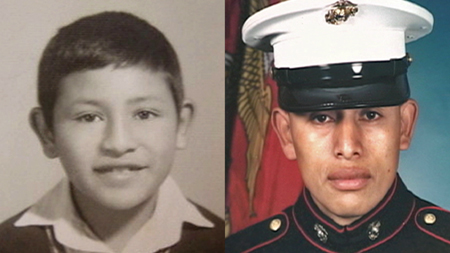|
Reviews of Recent Independent, Foreign, & Documentary Films in Theaters and DVD/Home Video
Directed by: Heidi Specogna. Produced by: Specogna & Peter Spoerri. Written by: Specogna & Erika Harzer. Director of Photography: Rainer Hoffmann. Edited by: Ursula Höf. Music by: Hans Koch. Language: Spanish, English, & German with English subtitles. Released by: Atopia. Country of Origin: Germany. 89 min. Not Rated. José Antonio Gutiérrez, a Guatemalan immigrant, enlisted in the Marines as a result of the Bush administration’s recruitment of “green-card soldiers,” foreign-born enlistees who would be promised fast-track naturalization. He became the first American casualty of the Iraq War and was granted citizenship posthumously. Consequently, this 2006 documentary has taken on even more urgency, considering the current immigration policy debate. What most jumps out of this digitally-shot film, however, is the complexity of his actions. Through the multiple perspectives on its enigmatic protagonist, the film pieces together José’s life, before clarifying that no one’s behavior can be completely understood, and that attempting to do so raises more questions. Whereas it initially appears as if the film will deal with the potentially controversial facts of Gutiérrez’s death by friendly fire, its true concern is uncovering what Patrick Atkinson, director of the orphanage where Gutiérrez stayed as a child, refers to as the “classical war propaganda” of an illegal alien who wanted to become an American Marine. (José lost his parents in Guatemala’s decades-long civil war.) Through an interest-piquing chronology methodically establishing issues not immediately addressed and, at times, ultimately only indirectly referred to, director Heidi Specogna traces Gutiérrez’s evolution from a sensitive and street-smart boy to his dangerous trek to the United States and his agonized decision to enlist – not to become a citizen, but to receive a paid education. The most moving scenes depict the perilous journey of migrants holding onto train cars and of a hospice for train accident victims, some of whom have lost limbs.
However, the frequent German voice-over (the film was produced in Germany) throws the viewer off and would be mitigated by highlighting more the
piece’s international aspect and the consequent indictment of worldwide military aggression (which, despite its short running time, the film briefly
conveys, in stressing the CIA’s role in the Guatemalan conflict). Reymond Levy
|

